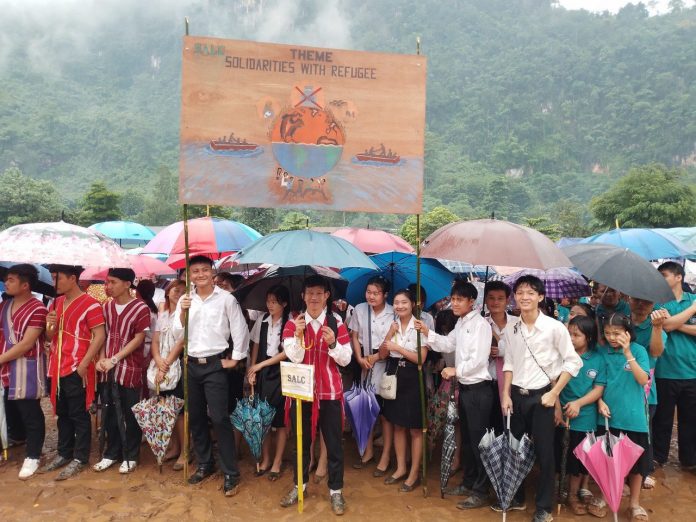Myanmar refugees across the region are facing increasing desperation as funding for humanitarian assistance declines and host countries tighten restrictions, human rights groups marking World Refugee Day 2025 told DVB on Friday.
“Future levels of funding remain uncertain, which will make it increasingly difficult to provide essential services to refugees,” said Max Morch, the advocacy, communication & reports manager at The Border Consortium (TBC), an agency providing services for 30 years to Myanmar refugees living at nine camps along the 1,501 mile (2,416 km) Myanmar-Thailand border.
Over 108,000 refugees from Myanmar live in the camps along Thailand’s western border, according to TBC. About 77 percent of them are from Karen State with a smaller portion from Karenni State, and other ethnic nationalities.
In its World Refugee Day statement, TBC described the situation in the refugee camps as “critical,” warning that continued funding shortfalls have disrupted essential services for refugees.
In January, the U.S. President Donald Trump issued an executive order suspending most foreign humanitarian aid programs, including vital support for refugee and humanitarian operations in Myanmar, Thailand, and beyond.
“Our futures cannot be predicted. Everything can change suddenly, and we don’t even have the right to create our own futures,” a refugee from Myanmar living in a Thai camp since 2007 told DVB on the condition of anonymity.
Refugees living along the Thai-Myanmar border are restricted from leaving the camps or seeking legal employment by the Thai government. The TBC calls on Bangkok to increase support and open legal pathways for employment and self-reliance.
“If refugees are able to support themselves, they would no longer need to rely on [non-governmental organizations] or government assistance. Refugees possess the skills, experience, and determination to be self-reliant; they simply need the opportunity to do so,” Morch added.
In a joint statement on World Refugee Day, nine Myanmar civil society groups warned of the dire situation facing not only refugees but also Internally Displaced Persons (IDPs) inside Myanmar who’ve fled their homes since the 2021 military coup.
“The [Myanmar] military is the root cause of the country’s worsening human rights and humanitarian crisis. Its relentless campaign of terror has displaced millions, both internally and across borders,” said the joint statement on June 20.
There are now over 3.5 million IDPs in Myanmar, according to the U.N. High Commissioner for Refugees (UNHCR). The nine Myanmar civil society groups called for urgent international action to protect this vulnerable population
Ahead of World Refugee Day, Fortify Rights released a report documenting arbitrary arrests and torture carried out against refugees, asylum seekers, and migrant workers in Malaysia, citing testimony from Rohingya and others from Myanmar.
“Malaysia must end these indiscriminate immigration raids, provide formal refugee status to people whose lives are in danger in their home countries, restore UNHCR’s full access to detention centers, and put in place clear safeguards so that no one fleeing persecution is tortured, arbitrarily arrested, detained or forcibly returned,” Yap Lay Sheng. a human rights specialist at Fortify Rights, wrote in the June 19 report.
In Bangladesh, over 1.1 million Rohingya refugees live in overcrowded camps near Cox’s Bazar, with a smaller number relocated to Bhasan Char. This accounts for 77 percent of all Myanmar refugees globally, according to the U.N.
Over 700,000 Rohingya fled to Bangladesh in 2017 during a Myanmar military “clearance operation” in northern Arakan State, which is now the subject of a genocide case at the International Court of Justice (ICJ) and accusations of crimes against humanity at the International Criminal Court (ICC).
The Rohingya camps in Bangladesh host the world’s largest number of refugees, according to humanitarian agencies, with 83 percent of Rohingya children unable to access formal education over the last eight years.
In Thailand, Karen and Karenni refugees are facing reduced food rations, healthcare, and livelihoods following U.S. funding cuts.
In Malaysia, Rohingya, Chin, Kachin, and other refugees from Myanmar, continue to face arrest and deportation, while India, China, Indonesia, and Laos have been also accused of carrying out forced returns of Myanmar nationals in violation of international law.
There are over 1.4 million Myanmar refugees and asylum seekers worldwide, according to the U.N.
Bangladesh hosts the largest number, with over 1.1 million, or 77 percent of this total. Malaysia is home to 179,100, or 12 percent, followed by India at 83,000, or 6 percent. Thailand hosts 81,000, or 5 percent, while Indonesia has 2,700, or less than one percent.
Filippo Grandi, the U.N. High Commissioner for Refugees, highlighted that 122 million people are now forcibly displaced worldwide, including the Rohingya.
He added that IDPs and refugees are facing increasing challenges as humanitarian funding fails to keep pace with the growing needs of those displaced from their homes, whether or not they’ve crossed an international border.



